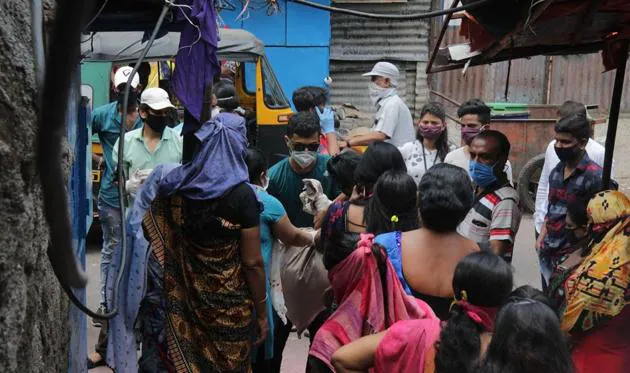There are 6,57,800 sex workers in India, according to a 2016 UNAIDS study. Other estimates put the number at three million. The lockdown and social distancing measures have pushed them to the edge.

NGO workers hand over dry ration to sex workers, Pune , June 23, 2020(Ravindra Joshi/HT PHOTO)
In March, Jayashree Patil learned that she had been accepted to a nine-month leadership training programme in Washington, DC. She had every reason to be proud. It was a competitive programme and she had completed her schooling under challenging circumstances. Then the coronavirus disease paralysed the world, and the training programme was deferred.
Patil, the daughter of a sex worker in Mumbai’s red-light district, Kamathipura, was devastated. “Next year I’ll be in university doing my BA. I won’t be able to take nine months off,” she told me on the phone. Patil’s road to change began when her father died in 2011 leaving her mother alone to provide for three children.
Someone put her in touch with Kranti, a non-governmental organisation (NGO), dedicated to empowering the daughters of sex workers to become agents of social change. A year later she moved into the organisation’s residential shelter that houses 25 girls.
The transition wasn’t easy. Her formal schooling had, at best, been spotty. For most children of sex workers, conditions at home aren’t conducive to learning. Many have no formal education and need to catch up before they can be integrated into schools. And when they do, they must deal with the stigma, and abuse, that follows.
Before she joined Kranti, Patil used to hide her mother’s identity. Now, she said, “I’m proud of her and what she did for us. She is my source of strength.”
She is proud also of her community. “I am lucky to have the love of so many mothers,” she said. Once, when a customer had looked at her sideways, he had to face the collective wrath of a dozen mothers. “Don’t you dare look at her. She is our daughter,” they yelled.
There are 6,57,800 sex workers in India, according to a 2016 UNAIDS study. Other estimates put the number at three million. The lockdown and social distancing measures have pushed them to the edge.
“Covid has posed unprecedented challenges to us,” said Trina Talukdar, one of Kranti’s co-founders. Children who were in residential schools are back home. Online classes aren’t possible because Internet access is patchy. And NGOs have had their hands full with basic relief work: Kranti provided 250 cooked meals a day as well as monthly groceries and toiletries to 3,000 families during the lockdown.
Even in the early days, funds were hard to come by. Now donor fatigue has set in and sex workers are forced to take high- interest loans just to survive, said Talukdar. Patil knows that times are difficult: “Sex workers are daily wage workers. But no government agency is focusing on relief for them.”
But she also knows that with no outside help forthcoming, it’s up to the community to help itself. The girls have helped with cooking; some are teaching zumba and meditation online for a small fee. “One day I will open a school for the children of sex workers,” said Patil. For now, the only question is how to survive.
Namita Bhandare writes on gender
The views expressed are personal
The views expressed are personal